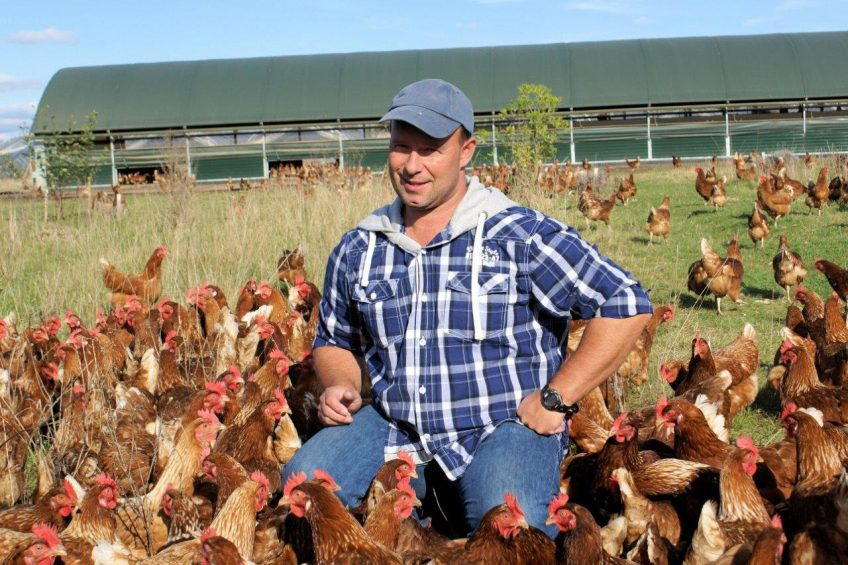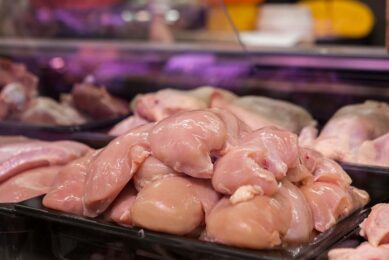Selective housing order: Free-range egg farmers face ruin

Free-range egg farmers have said they ‘face ruin’ if Defra keeps its housing order only for selected regions it deems at higher risk beyond 28 February.
The date marks the end of a 12-week EU derogation that allows eggs and poultry meat produced by housed birds to be marketed as free-range.
High risk areas hold 25% of UK poultry
While farmers in Wales and Scotland, and the majority of England, will be able to release birds providing higher biosecurity measures are taken, Defra plans to keep birds housed in regions it deems higher risk.
These ‘Higher Risk Areas (HRA)’ are thought to have around 25% of the registered poultry in the UK.
Bredpa was all birds out
The British Free Range Egg Producers Association (Bfrepa) has written to Defra minister Lord Gardiner urging the government to allow all poultry out after 28 February, subject to higher biosecurity.
It describes the proposals as ‘divisive’ among producers, and a ‘postcode lottery’.
Inconsistencies in Defra’s order
The letter, signed by Bfrepa chairman James Baxter, says: “It is hard to understand why there would be HRA’s on the English side of the Severn estuary and not on the Welsh side. Do infected waterfowl on the Severn estuary only fly east to the English side?
“Why would free-range eggs be readily available in Newport but not in Bristol? Similar examples on the Welsh marches can be found further North near Tewkesbury and Worcester.”
It goes on to say that these inconsistencies “further confuse” the situation, as most outbreaks have been in birds that are housed, not free range.
Farmer speaks out
Meanwhile, free-range egg producer Andrew Cardy has spoken of the frustration of finding himself in a Higher Risk Area.
“I thought the higher risk zones would be along the east coast and around areas which have already had outbreaks of avian influenza,” he told Poultry World.
“Instead, we ended up with sporadic ‘blobs’ across the whole country and, holy smoke, I then discovered we were in one of those blobs.
“When I looked at the detail, it just seemed so random. We farm close to the River Thames at Twyford (near Reading) and are deemed high risk, yet Wargrave, also on the River Thames, is just a mile-and-a-half away and is low risk.
“I fully understand that disease is transmitted by wild birds, but why are they any more likely to land on the Thames at Twyford than they are at Wargrave?
“I know some farmers who are nowhere near any rivers or marshes, yet are in high risk areas. It seems like a postcode lottery.”
Despite this, Mr Cardy says he would probably prefer to keep his birds indoors anyway, given there has just been another outbreak of H5N8 avian influenza in Suffolk.
“I am quite concerned that many producers in low risk areas will be letting their birds out from 1 March. They will be in great danger as it is still peak migrating season. At least my birds are safe.”
Eggs downgraded
Mr Cardy is also hopeful his own income will not suffer too much, despite the prospect of his eggs being downgraded from 1 March.
“Normally we have 5,000 layers producing 4,400 eggs a day, though right now we have 1 shed empty and are waiting for 3,000 pullets to arrive next week.
“About half our eggs are sold through an honesty shop on the premises – called The Egg Box – which sells about 1,200 dozen a week and turns over £140,000 a year. We have over 500 customers a week – and no staff.
“So yes, we will have to downgrade our eggs to barn eggs, but we will put up a poster in the shop saying that if customers want to pay 20p/doz less, they can do.
“In reality, I expect most will still want to pay the normal free-range price, so we are reasonably well protected from any market downturn for now.
“In 6 weeks’ time, however, the new pullets will hit full production. We would normally be selling the surplus eggs to a local packer, but he has already told us he won’t take anything that is not free-range.
“I just hope the supermarkets respond honourably (and hold prices). But longer term, if we are going to have this every year during migrating season, we will have to revisit the codes and reassess the way we define free range.”
Defra response
Chief veterinary officer Nigel Gibbens said: “Effective disease control will always be our priority. Based on the current situation, we believe mandatory biosecurity across England, combined with targeted housing or range netting in higher risk areas, is the best option to control disease, protect birds’ welfare and ensure consumers can buy free-range products.
“We have acted swiftly to limit the spread of H5N8, including requiring all birds to be housed or kept separate from wild birds.”
Join 31,000+ subscribers
Subscribe to our newsletter to stay updated about all the need-to-know content in the poultry sector, three times a week. Beheer
Beheer








 WP Admin
WP Admin  Bewerk bericht
Bewerk bericht